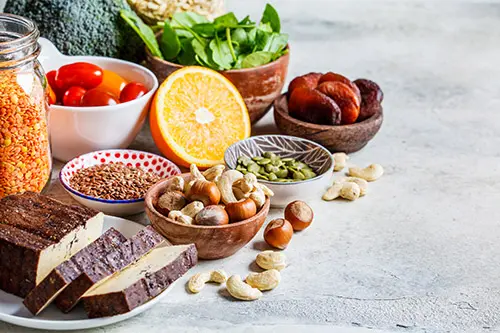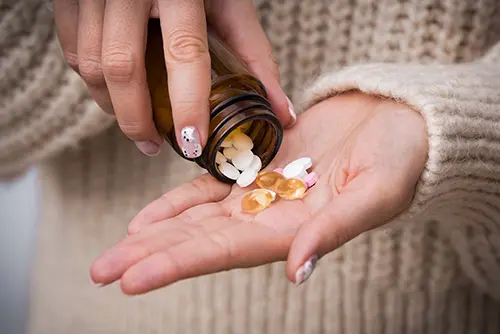The essential vitamin tests for vegan and plant-based diets
Medical review by
Dr Alasdair Scott MBBS FRCS PhDLast updated
Key Article Takeaways
- Plant-based diets put you at a higher likelihood of iron, B12 and vitamin D deficiency.
- Deficiency in these essential nutrients can cause problems with no symptoms.
- You can monitor your iron and essential vitamin levels with blood tests.
- If you’re on a plant-based diet we recommend our Iron, Vitamin D and B12 Deficiency Blood Test.
In the UK, plant-based vegetarian and vegan diets have become popular dietary choices1. Everyone has their own reasons but often the choice is down to health, welfare and environmental concerns. However, even though a plant-based diet has some potential health benefits, did you know that it can increase your chance of vitamin and mineral deficiencies? Animal products are rich in many essential nutrients that can be hard to source from plant-based alternatives. Do you know which nutrients you need to keep in mind to stay healthy on a plant-based diet? We'll explain which vitamins and minerals you could become deficient in, how to find good plant-based sources and how to test your essential vitamin levels to check you’re getting enough.
Vitamin and mineral deficiencies to know about if you’re on a plant-based diet
Plant-based iron deficiency
Iron is an essential mineral that comes in two different forms: haem and non-haem. Haem iron is the form your body can use the easiest and is only found in animal products like meat and fish. Non-haem iron is found in vegetables and is more difficult for your body to absorb2. Compounds like polyphenols are found in many vegetables and can decrease iron absorption3.
If you’re not getting enough iron, your body struggles to make haemoglobin for your red blood cells to deliver oxygen around your body. This can develop into iron-deficiency anaemia which causes low energy and fatigue.
If you’re on a plant-based diet, it’s a good idea to eat green leafy vegetables like spinach, purple sprouting broccoli and asparagus. These are all good sources of iron. Interestingly, vitamin C boosts the absorption of iron in your gut so drinking orange juice with these foods can help you get more iron from them. The opposite is true for caffeine, so avoid drinking tea or coffee with your iron rich meals. As iron from plant sources is less easily absorbed and the plants themselves can affect how much iron your body absorbs, it can be a challenge to keep your iron levels optimal on a plant-based diet.
If you’re feeling run down and don’t know why, it might be worth testing your iron levels.

Plant-based vitamin B12 deficiency
Vitamin B12 has lots of important functions in the body, including making your red blood cells. Just like iron-deficiency, lacking vitamin B12 could develop into anaemia, leaving you tired, run-down and more prone to infection.
If you’re not eating any animal products at all, eggs and dairy products like milk and cheese are all off the table. These foods are great sources of vitamin B12 so if you’re not getting them in your diet you could become deficient.
Vitamin B12 deficiency is an issue if you’re on a plant-based diet as it’s mainly found in animal products. You can get fortified foods containing vitamin B12, like some plant milks and cereals. Yeast, seaweed and some mushrooms are also plant-based B12 sources. Still, getting enough B12 through a plant-based diet alone can be challenging and you may need to also take a supplement.
You might have wondered whether plant-based diets are a risk for folate deficiency. Fortunately, dark leafy greens, beans and beetroot are great sources of folate, so most people eating these foods on a vegan diet do manage to get enough folate and folate deficiency is not common4.

Plant-based vitamin D deficiency
Vitamin D is an essential vitamin which you mainly make in your skin in response to sunlight and also get in small amounts from your diet. In the winter our body can use vitamin D reserves which we’ve stored from sunlight. But most of us don't get significant sun exposure in the summer to build up these stores. We’re almost all vitamin D deficient in the winter months, no matter what we eat.
Vitamin D deficiency is more likely if you’re on a plant-based diet because the best dietary sources of vitamin D happen to be animal-products. Those on vegan diets were found to have the lowest blood vitamin D levels compared to other diets, both in the summer and winter months5.
Vitamin D is important for bone health and for a strong immune system amongst other functions. If you become deficient in vitamin D you may feel tired, become more prone to infections, particularly colds and flu, and have achy bones.
Vitamin D3, also called cholecalciferol, is what we make in our skin when it’s exposed to sunlight. It’s also found in oily fish and eggs and in fortified foods like margarine, milk and some cereals6.
There’s another form of vitamin D called vitamin D2 or ergocalciferol. This is found in some plants and mushrooms, so is vegan-friendly. Some foods are fortified with the D2 form rather than D3. But the levels of D2 found naturally in plant-based foods are much lower than D3 in animal products.
Most of us in the UK could do with getting more vitamin D. The UK Government and Public Health England advise that everyone take daily vitamin D supplements of 400-1000 IU a day from October through to March when there isn’t as much sunlight7. If you do want to take vitamin D3 there are supplements made from lichen instead of animal products. Vitamin D2 supplements are always suitable for vegans.

Should you check your vitamin and mineral levels if you're on a plant-based diet?
In short - yes, definitely! We’ll talk you through the data but studies have shown that lots of people on plant-based diets have vitamin and mineral deficiencies. Checking your vitamin levels once or twice a year will make sure that you’re not one of them.
Iron deficiency is very common and affects approximately 15 in 100 people on a purely plant-based diet and 11 in 100 vegetarians. In comparison, 7 in 100 meat-eaters are thought to be iron deficient8.
B12 deficiency is also much more common if you don’t eat any animal products. In a study with 232 vegans, more than half of them were deficient in B124.
If you’re on a purely plant-based diet, you may be more likely to develop vitamin D deficiency. In winter months, vegans had 38% lower vitamin D in their blood than meat eaters. Even in summer, this was still 20% lower than in meat eaters5.
How and when to test for vitamin and mineral deficiency
You’re at higher likelihood of vitamin and mineral deficiency if you’re on a plant-based diet. Testing your vitamin levels is a simple and easy way to make sure your body has what it needs to be in great shape. If you’re on a plant-based diet, our Iron, Vitamin D and B12 Deficiency Blood Test is ideal. This is a simple finger-prick blood test you can do at home and send to our lab to check your iron, vitamin B12 and vitamin D levels all in one go. Our docs will check through your results and give you a full report and recommendations on any actions you might need to take.
If you’re on a plant-based diet but haven’t got any symptoms of vitamin deficiency, like tiredness or low energy, it’s sensible to check your levels once or twice a year. More than that is probably overkill.
However, if you’ve got symptoms, you should check your vitamin levels today. If a deficiency is to blame, we’ll help you get on top of things quickly. It’s usually a good idea to re-test your levels again a few months down the line to make sure they’re back where they should be.
Get tips on better health
Sign up to our emails on the better way to better health.
We'll keep you up-to-date with the latest research, expert articles and new ways to get more years of better health.


